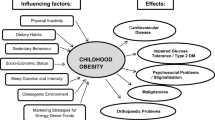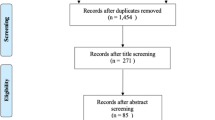Abstract
Childhood obesity is being considered a global health epidemic, and one of the countries mostly affected by it is Mexico. The aim of this study was to assess the perceptions of low-income mothers with regard to their child’s weight status and physical activity and their beliefs about healthy and high-density foods. A total of 813 mothers attending a vaccination centre at three primary care clinics in three different regions of Mexico, and their infants ranging from 5 to 24 months old, participated in the study. Anthropometrical measurements and interviews were conducted at the clinic. The child’s average age was 12.7 months. Forty-three percent of mothers underestimate their child’s weight status; this percentage jumps to 83% when we refer to mothers of overweight and obese children. Mothers with overweight and obese children, having a monthly income higher than 600 dollars, less than 6 years of education, and having migrated to their current state of residence are more likely to underestimate their child’s weight. A high percentage of the mothers wish their children were less active, and they do not consider that carbonated and non-carbonated sweetened drinks and high fat snacks might be dangerous to their child’s health. In conclusion, low-income, Mexican mothers highly underestimate their infant’s weight status and have higher risks of fostering an obesogenic environment.
Similar content being viewed by others
References
Walkins DC, Murray LJ, McCarron P, Boreham CAG, Cran GW, McGartland C et al (1995) Ten-year trends for fatness in Northern Irish adolescents: the Young Hearts Projects-repeat cross-sectional study. Int J Obes 29:579–585
Leibel RL (1995) Obesity: a game of inches. Pediatrics 95:131–132
Satter E (1990) The feeding relationship: problems and intervention. J Pediatr 117:S181–S191
Birch LL, Davison KK (2001) Family environmental factors influencing the developing behavioural controls of food intake and childhood OW. Pediatr Clin North Am 48:893–907.5
Baughcum AE, Powers SW, Johnson SB, Chamberlin LA, Deeks CM, Jain A et al (2001) Maternal feeding practices and beliefs and their relationships to overweight in early childhood. J Dev Behav Pediatr 22:391–4081
Scaglioni S, Salvioni M, Galimberti C (2008) Influence of parental attitudes in the development of children eating behaviour. Br J Nutr 99(Suppl 1):S22–S25
Gonzalez-Cossio T, Rivera-Dommarco J, Moreno-Macias H, Monterrubio E, Sepulveda J (2006) Poor compliance with appropriate feeding practices in children under 2 y in Mexico. J Nutr 136:2928–2933
Oliveria SA, Ellison RC, Moore LL, Gillman MW, Garrahie EJ, Singer MR (1992) Parent–child relationships in nutrient intake: the Framingham children’s study. Am J Clin Nutr 56:593–598
Johanssen DL, Johanssen NM, Specker BL (2006) Influence of parent’s eating behaviours and child-feeding practices on children’s weight status. Obesity 14:431–439
Klesges RC, Coates TJ, Brown G, Sturgeon-Tillisch J, Moldenhauer-Klesges LM et al (1983) Parental influences on children’s eating behavior and relative weight. J Appl Behav Anal 16:371–378
Ward CL (2008) Parental perception of childhood overweight in the Mexican-American population: an integrative review. J Sch Nurs 24:407–416
Jimenez-Cruz A, Bacardi-Gascon M, Castellon-Zaragoza A, Garcia-Gallardo JL, Hovell M (2007) Perception of body size among Mexican teachers and parents. Nutr Hosp 22(5):560–564
Jiménez-Cruz A, Bacardí-Gascón M, Armendariz-Anguiano AL, Marquez Ibañez B, Sepúlveda-Romo M, Revelles Rojas IC et al (2008) Mexican physicians’ bias toward the obese child. Nutr Hosp 28(1):64–65
Birch LL (1998) Development of food acceptance patterns in the first year of life. Proc Nutr Soc 57:617–624
Lanigan J, Turnbull B, Singha A (2007) Toddler diets in the UK: deficiencies and imbalances 2. Relationship of toddler diet to later health: what toddlers eat is important as it affects their present and long-term health. J Fam Health Care 17(6):197–201
Skinner J, Carruth BR, Bounds W, Ziegler P (2002) Children’s food preferences: a longitudinal analysis. J Am Diet Assoc 102:1638–1647
Ogden J, Jubb A (2008) How consistent are beliefs about the causes and solutions to illness? An experimental study. Psychol Health Med 13(5):505–515
Jackson M, Ball K, Crawford D (2001) Beliefs about the causes of weight change in the Australian population. Int J Obes 25:1512–1516
Hardus PM, Van Vuuren CL, Crawford D, Worsley A (2003) Public perceptions of the causes and prevention of obesity among primary school children. Int J Obes 27:1465–1471
INEGI (2009) II Conteo de Población y vivienda 2005, México y sus municipios.www.inegi.org.mx (Access May 17, 2009)
United Nations Human Development Index Report (2009) http.undp.org (Access July 20, 2009)
World Health Organization (2006) WHO child growth standards: length/height-for-age, weight-for-length, weight-for-height and body mass index-for-age: methods and development (2006). World Health Organization, Geneva
Baughcum AE, Chamberlin LA, Deeks CM, Powers SW, Whitaker RC (2000) Maternal perceptions of overweight preschool children. Pediatrics 106:1380–1386
Birch LL, Fisher JO (1998) Development of eating behaviours among children and adolescents. Pediatrics 101:539–549
Myers S, Vargas Z (2000) Parental perceptions of the preschool obese child. Pediatr Nurs 26(1):23–30
Crawford PB, Gosliner W, Anerson C, Strode P, Becerra-Jones Y, Samuels S et al (2004) Counselling Latina mothers of preschool children about weigth issues: suggestions for a new framework. J Am Diet Assoc 104(3):387–394
Eckstein KC, Mikhail LM, Ariza AJ, Thomson JS, Binns HJ (2006) Parents’ perceptions of their child’s weight and height. Pediatrics 117(3):681–690
Tyler DO (2004) Overweight and perceived health in Mexican American children: a pilot study in a central Texas community. J Sch Nurs 20(5):285–292
Maximova K, McGrath JJ, Barnett T, O’Loughlin J, Paradis G, Lamber M (2008) Do you see what I see? Weight status misperception and exposure to obesity among children and adolescents. Int J Obes 32:1008–1015
Ke Rhee, Delago CW, Arscott-Mills T, Mehta SD, Davis RK (2005) Factors associated with parental readiness to make changes for overweight children. Pediatrics 116:E94–E111
Melgar-Quiñonez HR, Kaiser LL (2004) Relationship of child-feeding practices to overweight in low-income Mexican-American preschool-aged children. J Am Diet Assoc 104(7):1110–1119
Kaiser LL, Melgar-Quiñones HR, Lamp CL, Johns MC, Harwood JO (2001) Acculturation of Mexican-American mothers influences child feeding strategies. J Am Diet Assoc 101:542–547
Haisma H, Coward WA, Albernaz E, Visser GH, Wells JC, Wright A et al (2003) Breast milk and energy intake in exclusively, predominantly, and partially breast-fed infants. Eur J Clin Nutr 57:1633–1642
Olaiz-Fernández G, Rivera-Dommarco J, Shamah-Levy T et al (2006) Encuesta Nacional de Salud y Nutrición 2006. Instituto Nacional de Salud Pública, Cuernavaca
Acknowledgments
We thank Martha Rivera-Grimaldo for her assistance and editing of the manuscript. A special thank you is extended to the Universidad Autonoma de Baja California, Universidad Autonoma de Chiapas and the Universidad Autonoma de Tamaulipas for their support in making this study possible.
Author information
Authors and Affiliations
Corresponding author
Additional information
All the authors participated in the design and analysis of the project, the interpretation of the results, and the writing of the paper.
Rights and permissions
About this article
Cite this article
Jimenez-Cruz, A., Bacardi-Gascon, M., Castillo-Ruiz, O. et al. Low Income, Mexican Mothers’ Perception of Their Infants’ Weight Status and Beliefs About Their Foods and Physical Activity. Child Psychiatry Hum Dev 41, 490–500 (2010). https://doi.org/10.1007/s10578-010-0183-4
Published:
Issue Date:
DOI: https://doi.org/10.1007/s10578-010-0183-4




